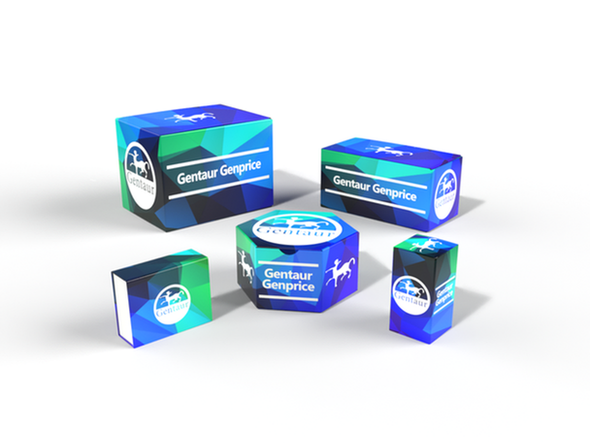Description
SCRN1 Antibody | 5849 | Gentaur UK, US & Europe Distribution
Host: Rabbit
Reactivity: Human, Mouse, Rat
Homology: Predicted species reactivity based on immunogen sequence: Bovine: (100%)
Immunogen: SCRN1 antibody was raised against a 20 amino acid synthetic peptide near the carboxy terminus of human SCRN1.
The immunogen is located within amino acids 320 - 370 of SCRN1.
Research Area: Cancer, Cell Cycle
Tested Application: E, WB, IHC-P, IF
Application: SCRN1 antibody can be used for detection of SCRN1 by Western blot at 1 μg/mL. Antibody can also be used for immunohistochemistry starting at 5 μg/mL. For immunofluorescence start at 20 μg/mL.
Antibody validated: Western Blot in human samples; Immunohistochemistry in human samples and Immunofluorescence in human samples. All other applications and species not yet tested.
Specificiy: N/A
Positive Control 1: Cat. No. 1305 - Human Kidney Tissue Lysate
Positive Control 2: Cat. No. 10-401 - Human Kidney Tissue Slide
Positive Control 3: N/A
Positive Control 4: N/A
Positive Control 5: N/A
Positive Control 6: N/A
Molecular Weight: N/A
Validation: N/A
Isoform: N/A
Purification: SCRN1 Antibody is affinity chromatography purified via peptide column.
Clonality: Polyclonal
Clone: N/A
Isotype: IgG
Conjugate: Unconjugated
Physical State: Liquid
Buffer: SCRN1 Antibody is supplied in PBS containing 0.02% sodium azide.
Concentration: 1 mg/mL
Storage Condition: SCRN1 antibody can be stored at 4˚C for three months and -20˚C, stable for up to one year. As with all antibodies care should be taken to avoid repeated freeze thaw cycles. Antibodies should not be exposed to prolonged high temperatures.
Alternate Name: SCRN1 Antibody: SES1, KIAA0193, Secernin-1
User Note: Optimal dilutions for each application to be determined by the researcher.
BACKGROUND: SCRN1 Antibody: SCRN1 was first identified as a cytosolic protein that is involved in the regulation of exocytosis from peritoneal mast cells. More recent studies have shown that SCRN1 expression is upregulated in gastric cancer cell lines and may possess epitopes that could function as tumor-associated antigens, potentially providing targets for cancer vaccines in the treatment of gastric cancers. Another report indicates that decreased expression of SCRN1 via RNAi expression resulted in significantly lower rates of cell growth in colorectal cancer cell lines, and increased SCRN1 expression in patients with colorectal cancer correlated with poor prognosis, suggesting that SCRN1 may also be involved in the regulation of cell growth and might be useful as a prognostic tool.





![SCRN1 Antibody (N-term) [APR05605G] SCRN1 Antibody (N-term) [APR05605G]](https://cdn11.bigcommerce.com/s-1rdwiq712m/images/stencil/590x590/products/58307/58611/gentaur-genprice__26005.1661610467__29809.1661628092__75433.1661676199__77988.1661684280__64362.1661692443__64660.1661854816.png?c=1)
